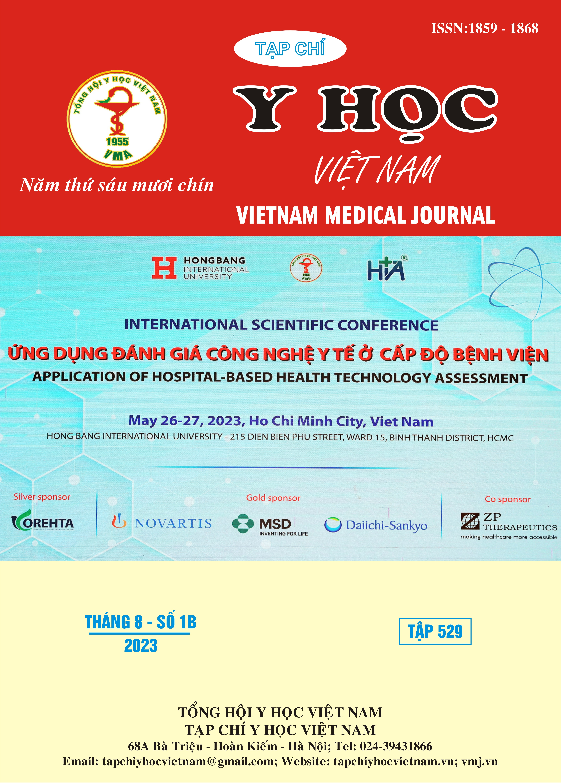KNOWLEDGE ATTITUDES OF WOMEN ABOUT IMPLANON NXT
Main Article Content
Abstract
Objectives: To assess women's knowledge and attitudes about Implanon NXT at the National Hospital of Obstetrics and Gynecology in 2022–2023. Methods: A cross-sectional study was conducted on 185 women who were consulted about contraceptive methods. Results: Knowledge: 55,7% (n=103) of women have poor knowledge (≤23,4 points), 33%(n=61) have average knowledge (23,4<<31,2 points) and 11,3% (n=21) have good knowledge about Implanon NXT (≥31,2 points). Attitude: 51,4% (n=95) of women have a bad attitude (<40 points) and 48,6% (n=90) of women have a good attitude (≥40 points) about the contraceptive implant. Factors related to knowledge and attitudes about Implanon NXT are respective: employment (more employed women have correct knowledge and attitude about contraceptive implants than non-employed: (OR=10,54, CI 95%: 1,31-84,95, p=0,027, OR=13,62, CI 95%: 1,69-109,79, P=0,014), address status (urban women have correct knowledge and attitudes than suburb women: (OR=2,96, CI 95%: 1,35-6,50, p=0,05, OR=2,33, CI 95%:1,13-4,92, p=0,021), education status (more well-educated people have correct knowledge and attitudes than low-educated people: (OR=2,65, CI 95%:1,38-5,09, p=0,03, OR=2,33, CI 95%:1,13-4.92, P=0,021) and experience with Implanon NXT (more previous experience with this contraceptive method have correct knowledge and attitudes about Implanon than not previous experience with contraceptive implants: (OR=22,15, CI 95%: 5,06-96,95, p<0,001, OR=7,81, CI 95%: 2,58-23,64, p<0,001). Conclusions: Women’s knowledge about contraceptives, especially contraceptive implants is still limited, and correct awareness about contraceptive implants is still low.
Article Details
References
2. Cao Hữu Thịnh. “Tỷ lệ và các yếu tố liên quan đến tình trạng rút que Implanon trước thời hạn tại bệnh viện Từ Dũ”. Luận văn thạc sĩ y học, Đại học Y Dược TP Hồ Chí Minh. 2016:tr. 76-77.
3. Mubarik Mehwish, Jameel Nazia, Noman Rehana. Knowledge, attitude and utilization of sub-dermal birth control implants among married rural women of Pakistan. International Journal of Research in Medical Sciences. 2016;4:2229-2239.
4. Shaikh I. B., Jafry S. I. A., Zulfiqar Hyder Naqvi S. M., Firdous S. N. Knowledge, attitude and practices regarding implants among women of childbearing age. J Pak Med Assoc. 2021;71(3):993-996.
5. Tài Hồng Thành. "Kiến thức và thái độ của phụ nữ về que cấy tránh thai ở phụ nữ đang dùng Implanon tại bệnh viện Từ Dũ". Luận văn thại sỹ y học, Đại học Y Dược TP Hồ Chí Minh. 2015.
6. Meskele M., Mekonnen W. Factors affecting women's intention to use long acting and permanent contraceptive methods in Wolaita Zone, Southern Ethiopia: a cross-sectional study. BMC Womens Health. 2014;14:109.
7. Gebre-Egziabher Desta, Medhanyie Araya Abrha, Alemayehu Mussie, Tesfay Fisaha Haile. Prevalence and predictors of implanon utilization among women of reproductive age group in Tigray Region, Northern Ethiopia. Reproductive health. 2017;14(1):1-9.
8. Bachorik A., Friedman J., Fox A., Nucci A. T., Horowitz C. R., Diaz A. Adolescent and Young Adult Women's Knowledge of and Attitudes Toward Etonogestrel Implants. J Pediatr Adolesc Gynecol. 2015;28(4):229-233.


